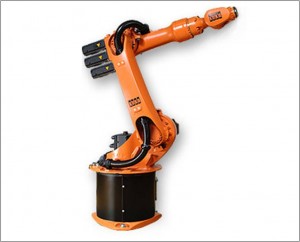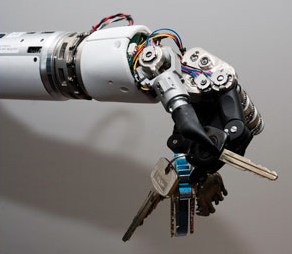or Mechatronic Engineering, humourously (but incorrectly) referred to as Megatronics at times. In Afrikaans Megatronika or Megatroniese Ingenieurswese. What is it? What can you do with it? When I started studying I didn’t know, after 5 years I think I have a vague idea. So below I’m going to post what I know.
In it’s simplest form it’s a combination of Mechanical and Electronic Engineering. If I really don’t feel like explaining, I simplify it to robotics. This is certainly a large portion of Mechatronics, but by no means a limiting factor.
Mechatronics as a named profession is fairly new, but the idea has always been there. In the South African context, UCT have had an accredited BSc (Eng) Mechatronics course since 1997 (although how long it has actually been running is uncertain), NMMU a BEng since 2007 (first graduates) and Stellenbosch since 2005 [1]. Potchefstroom University (NWU) are apparently aiming to start a course in the next few years [2]. Although not offered in the BEng format, UKZN do offer Masters through their Mechatronics and Robotic Research Group [3]. [EDIT: added list of BTech degrees and Diplomas offered at the bottom of the post]
Mechatronics at Stellenbosch [2]
I completed my BEng Mechatronics at Stellenbosch University in 2011. The Mechatronics course was presented by the Department of Mechanical and Mechatronic Engineering in a four year course. The first two years were identical to that of those studying towards a BEng Mechanical. The first year course is identical for all engineering students. In the third and fourth years, the two courses still followed similar routes, with the Mechatronics course replacing several Mechanical courses with some courses presented by the Department of Electronic and Electrical Engineering. In third year these included Electronics and Computer System’s courses and fourth year Electronics and Electronic Design Courses. Losing out on some Strength of Materials and Thermo-Fluid Mechanics.
The department put it this way [6]
The most important difference between the mechanical engineering programme and the mechatronic programme is that mechanical engineers are equipped to develop mechatronic systems with existing controllers (computers, PLC’s, etc.), while mechatronic engineers are also equipped to develop specialised controllers (e.g. for embedded controllers) and the relevant electronics themselves.
At the time, the Head of Department felt that Mechatronics as an entity was still too new. Employers weren’t advertising for Mechatronic Engineers, and didn’t really know what to do with them when they did get them. This resulted in the close ties between the Mechanical and Mechatronic courses. I was often unhappy about this, having would of preferred more focus on the Electronics, but in the end it worked out. And the HoD’s opinions were/are valid.
When I chose Mechatronics, I didn’t know where I was going to work, I chose the course because it sounded interesting. It wasn’t until my final year that I found a direction to work towards. Course setups at different universities are going to be different, and will put emphasis on different subjects, that doesn’t necessarily make one better than the other. Either way you’re going to come out of it with a degree and a fair amount of knowledge. Most importantly though (and this is true for any engineering degree) is you’ll know how to learn.
I’m quite confident that specific things that I learn in my first year of work will be of more value to my career than a specific subject at varsity, but having struggled through several subjects, I know I can figure out most things that come my way. I know where to look and how to go about solving problems.
In my final year we were a class of 85 Mechanical/Mechatronic students, of which I’d say about 30-35 received their BEng Mechatronics in 2011.
Mechatronics at NMMU [2]
NMMU have a slightly different setup. Mechatronics is presented by the Mechatronics school of the Department of Engineering, the Built Environment and IT. Mechatronics is the only Engineering degree they offer. As such, first year physics and maths are taken alongside BSc students and after the first year, courses taken are aimed only at Mechatronics students. The format of the course is still identical to that of when it started giving a good balance of subjects. The University also offers an array of BTech degrees in other Engineering fields.
I’m currently pursuing my master’s degree at NMMU. Their 4th year BEng Mechatronics class has roughly 25 students in it and the 3rd year class about 30. First year applications are limited to 60, with the most recent 1st year class starting with 50 students. The Mechatronics department is currently sponsored by General Motors South Africa (who have a plant in PE) and also have close ties to the Volkswagen plant in Uitenhage.
Mechatronics in General
Mechatronics as a career is still finding its feet. Meaning many consider it a jack of all trades, master of none type of situation, and although the course may feel that way, it’s certainly not the end of the story.
Mechatronics isn’t a new field, it’s just finally been given a name. When you tell people you’re a Mechatronic Engineer they don’t know what that is. I had a month stint at a large production facility as part of vacation training and I was asked to choose between focusing on their Mechanical or Electrical divisions, eventually settling for a bit of time at each. But that’s how businesses in SA are structured. This will change.
Several Mechatronic Engineers that I know have taken up Automation maintenance posts. Nothing wrong with this, personally it’s not where I want to be. Contrary to this though, my first job next year will be in automation maintenance. I however plan to use this as a stepping stone into a design career.
Automation is fun, and whereas I am going into automation in a production sense, automation also relates to smaller and/or more technical situations. The recent landing of the Curiosity rover on Mars is a perfect example of Mechatronic systems. There are several elements here, from the automated landing system to the remote control of the device.
In the motor industry, systems such as traction control, ABS and ESP are all examples of Mechatronic systems. Heavily complicated systems that rely on the processing of data from sensors to enable control of actuators. As such a Mechatronic Engineer can make him/herself home in many different industries. These include the Automotive, Aerospace, Manufacturing, Medical and Communications Industries.
Mechatronic Engineers can register with ECSA to become Professional Engineers [4]. The industry is governed by the South African Institute for Mechanical Engineers. I don’t see Mechatronics separating from this tree any time soon. The degree, being accredited by ECSA also means that the degree will be recognised internationally in many countries thanks to the Washington, Sydney and Dublin Accords [5]
So what do you do when you have your degree? You do whatever you want. You’ll find something. I’m not aware of any of my colleagues who are currently not pursuing a post-graduate degree or are employed. Not all of them are in Mechatronic specific posts. Some have opted for more mechanical orientated jobs, while others have gone entirely into areas such as electronic design or programming. And that’s one thing, a degree in Mechatronic Engineering in no way limits you. Very few engineering degrees will actually.
After re-reading what I’ve written, I think I’ve put forward some information relating to Mechatronic Engineering, but it’s still left fairly vague, maybe it’s just because none of us know what we’re really doing :)
A National Diploma in Mechatronics (for registration as a Professional Engineering Technician) can also be had from the following institutions [7]:
- Tshwane University of Technology
- UNISA
- Cape Peninsula University of Technology
A BTech in Mechatronics (for registration as a Professional Engineering Technologist) from [8]:
- Tshwane University of Technology
- UNISA
- Cape Peninsula University of Technology
and to reiterate, a BEng, or BScEng (for registration as a Professional Engineer) [1]:
- Stellenbosch University
- University of Cape Town
- Nelson Mandela Metropolitan University
Note: Although other institutions may offer courses in Mechatronics, or Mechanical Engineering with a focus on Mechatronic elements, the ones listed above are the only ones recognised by ECSA for registration as a mechatronic professional. Information was correct at time of posting, but may have changed since.
There are also several Universities of Technology and FET Colleges which offer courses in Mechatronics. CPUT is one of these institutions. Another training institution is Umbilo Training Specialists in Durban. They are running a free training course, once a month where anyone can come to learn more and expand their knowledge. Checkout their page for details.
For some more reading and a very complimentary view with some poignant remarks have a read here.
As part of my degree at Stellenbosch University I completed a project which can be seen here.
As part of my master’s degree at NMMU I completed a project which can be seen here and here.
If you’re looking for bursaries, try this website.
If you have any questions, feel free to ask in the comments section.
- [1] ECSA – Accredited Universities
- [2] Much of what is stated comes from my own experiences and conversations with relevant people.
- [3] UKZN – Mechatronics and Robotics
- [4] ECSA – Registration
- [5] ECSA – Recognised Qualifications
- [6] Stellenbosch University – Mechatronic Engineering
- [7] ECSA – Accredited Diplomas
- [8] ECSA – Accredited BTech





Mechatronics at UCT falls under electrical engineering department and at stellenbosh university by mechanical engineering department. Do they have the same courses or are they totally different
They are not totally different, they will have majority of the same courses, but from discussions with UCT students, the UCT course does have a slightly stronger emphasis on the electronic subjects, and the Stellenbosch course on the Mechanical subjects.
Hi, Gareth
Thanks for shining light on us about mechatronics.
i fell interest on mechatronics, my self I studied Electrical Engineering at college and I passed it by flying colours so i won’t to know it will be easy to change my stream to mechatronics as am saying this year I want to upgrade my matric results, please tell me how many points did they need at various university to study mechatronics? Am at Limpopo i can’t get to go to stellenbosch
Hi Thapelo. Universities have different requirements which change every year, you need to contact them individually to check latest info. However you have already completed a year of engineering which will help a lot in your application to a university
Hi, thank you for this blog.
Im a Technical Recruitment Specialist based in Johannesburg.
I have a Client who normally seeks to employ Application Engineers from a Mechatronics background and specifically from Stellenbosch and Wits due to some advanced application technology.
Interested engineers with at least 2-3 yrs experience are free to email their CVs to Consultant@mgsgroup.co.za
Hi Gareth,
I’m not a politician!
I feel very humbled by your knowledge, and highly appreciate the time and effort that you put in advising others when it comes to Mechatronics and Engineering as a whole.
You country needs you!!
I have a question of my own!
I studied a national diploma in Electrical Engineering (Process Instrumentation) at a University of Technology based in Durban. I feel very low as far as Engineering knowledge is concerned. I feel the need to go further and study more.
Like some people on this Blog, I’m sort of stuck!
The road forks into two roads for me, at least that’s what I think for now. One roads leads me to BTech in Electrical Engineering, the other road leads me to either a BSc/BEng degree in Electronic Engineering or Mechatronics (robotics). I am soooo confused!! A BTech feels like nothing to me if there’s still a BEng or BSc. How would you advise me taking into consideration my current qualification? Should I register for an BSc/BEng Electronic Engineering/Mechatronics or carry on with the BTech? The choice between Electronics or Mechatronics would have to come after I choose whether to carry on with BTech or not. Please advise.
Kind regards,
Marvin
Hi Marvin, with a Diploma you have direct access to a one year BTech degree. Alternatively you would have to do 4 years over (maybe with some credits off) to get your BEng or BSc Eng. Both are considered QNF level 6 qualifications. In industry there may be some debate as to the equality of the two courses; people with the different degrees will have different strengths due to the different training, but both capable in their own manner. At the same time you must consider what you want to do, the type of work you want to do and determine the best course of action.
Hi Marvin
I have several graduates in your situation enrolled with me. If you need assistance, I can help. You can contact me on email uts.tech@vodamail.co.za for a life changing experience.
hi, im a second year mechatronics students at tshwane university of technology,i only want to know that did i choose the right institution for the course?
Hi Herald, I don’t understand, what do you mean by the right institution? If it’s the decision you made, then it’s the right decision for you.
What is aeronautical engineering about?
“The aeronautical engineering team are responsible for the creation of newer, safer and more energy-efficient, economical methods for travel including airplanes, helicopters, missiles, satellites and spacecraft.”
– link
Iam currently in Mbilwi Secondary school in Limpopo. I want to become a mechatronics enginner and I do science and math at my school, I want to enrol for the university of capetown. how much marks do you think I should be averaging and is it possible to start a company of my own as a mechatronic enginner. as a company I mean one like STARK in the movie IRON MAN
Hey there, to get into an engineering degree, you generally need to keep your Maths and Science marks above 60%, and the higher the better. Check with the UCT admissions office for exact figures, as these change from year to year. Technicons and colleges may offer diploma courses with lower entry requirements.
Anyone is able to start a company, regardless of what you studied. It requires a lot of passion, good ideas and hard work, but there’s nothing stopping you creating your own business. How big it gets, and whether anything could compete with Stark industries however depends on a lot of external factors ;)
Good luck.
Hi there Gareth, first of all thank you for the blog, it has really helped me a lot.
I am a grade 11 student at the Mbilwi Secondary School of Maths and Science and would like to study for a BEng in Mechatronics , I read above that you received a scholarship from the universities and was wondering what requirements I would need to secure one in the the University of North West , Cape Town and NMMU.
Thank you again for the information.
Hi Tshifhiwa, different univesities offer different options to students. The best option is to contact each university directly to find out what they offer. You can also search around for large companies which may offer bursaries Good luck.
hi Gareth
I have been following the recently , the information is quite helpful.I also did B.eng Mechatronics eng and graduated year 2014.I am also looking forward to pursue my studies ie M eng in Automation and control or electrical power engineering .I wanted to know are there bursaries easy to access in S.A universities which is there to sponsor studies ,my major constrain is the finance .How do i go about it?
I
Hi Chris are you referring to bursaries for studying a masters degree? And are you a local or international student?
Hi Gareth
I’m currently in matric and have been accepted to study Mechatronic engineering at stellenbosch next year. I decided to apply because I thought it sounded interesting but after hearing from a few friends at uct, apparently the work load is a lot more hectic than other courses and one even said at times they have to study from 8-5 every day. This seems a bit over exaggerated but I was wondering if all the effort is worth the result? And after all the effort being put in to get such an advanced degree, is the salary at the end worth the effort as well? Money is not a deciding factor for me but if I’m going to do something this challenging I would hope to get something worthwhile out of it. Thanks for your help!
Hey Madi
That’s not a straightforward question. I wouldn’t say Mechatronics is specifically more work than any other engineering degree course. But there is also a huge discrepancy in how much effort different people need to and actually do put into their studies. When I was at Stellenbosch we write a test week at the end of the term, where every day you write a test on the first terms work. Some times I would study every day for a lot longer than from 8-5, but that is not the norm. Most week days you will be busy from 8-5 with classes and tutorials, and often you will have some work to do in the evenings, but it’s all about how you manage it.
I’m happy with what I got out for what I put in. There are people who worked harder than me, and there are those he got away working less. We all have the same degree. Is the salary worth it? I don’t know, what is enough for you? There are people who worked as hard as me but studied something else and are earning less than me.
I enjoyed my mechatronics course, and the type of work it has opened up to me made it worth my while.
Hope this helps
Hi Gareth
I’m currently studying at UP mechanical engineering,I thought it was possible to be a Mechatronic Engineer,because I once did check their Mechanical programme it had specialisation in Final year from Aeronautics to Mechatronics,If I would have to specialise in Mechatronics would I still be considered a Mechanical or Mechatronics engineer after getting the degree?
Hi Xolile, I’ve said it a few times, but just because you didn’t study mechatronic engineering doesn’t mean you can’t be a mechatronic engineer. UP is not accredited to give out BEng Mechatronic or Aeronautic degrees, however from their website they do offer a specialisation in aeronautical engineering for final year students, and from what you said for mecahtronics as well.
This means that although your degree will be a BEng Mechanical, you will have more specialised training in Mechatronics than other students with a normal BEng Mechanical.
So your degree will be Mechanical, but you can pursue work in any area.
And again how does Mechatronics differ from Electro Mechanical engineering that is only offered at UCT?Can it be obtained as a postgraduate degree?
I don’t know the Electro-Mechanical course too well but it is presented by the MechEng deparment whereas the Mecahtronics course is presented by the E&E department, so I imagine each one will tend to put more emphasis on their home subjects. You can read a bit about the Electro-Mechanical course here. It seems the E&E website has had some recent problems and doesn’t have much info atm.